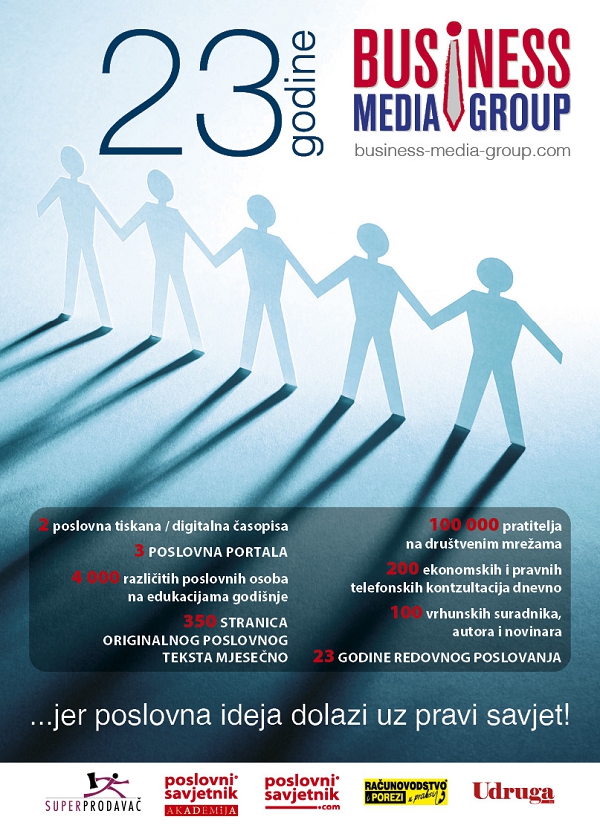JOHN LODDER: Should Top Leaders Change?
‘75% of the top executives that come to me for coaching rate themselves in the category of the top 25% of best leaders’. (Professor Manfred Kets de Vries, INSEAD)
Of course this is mathematically impossible! In many behaviour-related areas, human beings consistently think they are better than they are, in Psychology this is called a "self-serving bias."
The fact is that most well-intentioned and hard-working people believe they are doing the right thing, or they wouldn't be doing it. Of course this also applies for Top executives.
What is the market situation for your organisation?
In a year from now Croatia will join the European Union, meaning that the Croatian market will be part of a big European - open - market. ‘Open’ means a free market with a lot of opportunities but also with competition, EU-companies have their marketing-strategies and -plans ready.
What about Croatian companies? Is your company ready for that change? In what way is your company prepared for entering the EU? Prepared for competition? On what strategy is your marketing plan focussing? Are your people trained and fit?
Focus on the internal organisation or focus on the market?
Unfortunately I see a lot of companies still focussing on internal issues, not looking outside; to see what is going on in the market. They are not thinking about how to involve their stakeholders like, the most important of all: their (potential) customers. Or they just do not know how and ‘forget’ about this issue, hoping for…. But, doing nothing will bring you nothing and get you nowhere. Where Customer Relation Management (CRM) is taken over by Customer Emotion Management (CEM) in Western companies, companies here are still struggling with CRM issues and items as Brand Management.
I do not know about you but I seldom feel treated as a customer in Croatia; they do not welcome me as being a person who is visiting them to give them my heavily earned money.
And, as Peter Drucker said: ‘the only purpose of a company is to serve its customers, they are the only reason that you exist and can stay successful’.
What do foreign companies do to make their organisation fit for the future?
They have professional Marketing and HRM departments that are focussed on external developments and they cooperate in ‘translating’ these developments into the strategy of their company.
As an actual example: research from the Institute For The Future (IFTF) highlights a few key drivers in the market that will affect all companies in the coming years. The marketing professional adjusts this to the company (marketing) strategy and brainstorms with HRM about the implications for the company’s needed management and employee skills and knowledge.
Some examples of these required skills in the emerging, changing markets are e.g.:
- Cross-cultural competences as the ability to operate in different cultural settings (norms, values, habits, speaking foreign language etc.)
- Trans-disciplinarity as the ability to understand concepts across multiple disciplines within the company
- Design mind-set as the ability to represent and develop tasks and work processes for desired outcomes
- Cognitive Load management as the ability to discriminate and filter information for importance, and to understand how to maximize cognitive functioning, using a variety of tools and techniques
- New media literacy as the ability to critically assess and develop content that uses new media forms, and to leverage these media for persuasive communication with your stakeholders (especially your customers)
- Virtual collaboration as the ability to work productively, drive engagement and demonstrate presence as a member of a virtual team
- Novel and adaptive thinking as the ability of thinking about developments and coming up with solutions and responses beyond that, stimulating co-creativity and innovation
- Social intelligence as the ability to connect to others in a deep and direct way, to sense and stimulate reactions and desired interactions
- Sense making as the ability to determine the deeper meaning or significance of what is happening and being expressed
Foreign companies also work in bad economic times, need to cut costs but, nevertheless, they invest in management and training programs around these skills for their staff to make them fit for the company’s future. These Top leaders understand the importance of training and development.
What does this mean for employees?
‘Employability’ is a term relatively new in Croatia and means that every employee is responsible for his/her own career and personal development. Even in Governmental positions there is no certainty to keep your life-time lasting job anymore. You already see the development from people getting a job through connections to companies hiring people based on their skills. Employees have to take their own responsibility for their personal attractiveness in the job market.
What does this mean for the Top leader?
Most Top executives understand the famous line of Gandhi: "Be the change you want to see in the world." For setting up and implementing a change program, asked by HR professionals or consultants, Top management often commit themselves to "being the change" by personally present themselves as the role-model showing the desired behaviour. However, in practice nothing significant changes.
The reason is that most Top leaders do not see themselves as ‘part of the problem’. So actually they do not believe that it is them who need to change first, even though in principle they agree that leaders must model the desired changes. If the leader does not change, nothing will change!
As an example: How many executives when you ask them personally will say "no" to questions like: "Do you consider yourself to be trustworthy?" or "Are you customer-focused?" and, how many will say "yes" to the question "Are you a bureaucrat?" My personal guess is that not many will.
Every Top executive however is responsible for the success of his/her company. And this can only be achieved by having an adequate marketing strategy, a committed and fit workforce that productively cooperates toward common goals, and, the company as a whole is completely focussed on their customers. The Top leader is the ‘cement between the stones’ in co-creating this process.
Is Croatian management changing?
In four recent projects in Croatia I saw how management teams and boards worked together in creating a vision and shared this with their employees; they honestly work on creating a sense of commitment and ‘shared ownership’ so that employees feel they have a real ‘say’ in the developments that touches all and that commits them all to the vision and mission.
In this these Top leaders invest time, money and especially ‘trust’ and ‘honesty’ and continuity.
This is definitely a tough process and it takes time because it is, in general, not in the culture that employees are invited to think along with their top management. We see issues as fear to speak up what an employee really thinks; the hierarchy is still strong in the minds.
But employees most of the time know better than their management what their customers want, they are a source of huge information that a company needs.
Top leaders who understand this and who have the flexibility to really involve their employees in a process of cooperation and co-creation toward a mutual future will be the winners in the coming years.
“Without a compelling cause, our employees are just physically present and putting in their time.
They know rather well what should be done but they were never asked, or worse, they were forbidden to speak up.
Then their minds might be engaged partially, but their hearts are certainly not.
Meaning making precedes commitment and motivation."
(Free after Lee J. Colan)
www.balance-consultancy.com for: Strategic Management & Marketing, Change Management & Organisation Development, HRM, Coaching and Counselling















